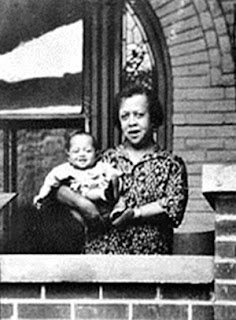Source: Colorado Health Care History
Ford, Justina Laurena Carter (22
Jan. 1871-14 Oct. 1952), physician, was born in Knoxville ,
Illinois , and grew up in Galesburg in the west central part of the
state. She was the seventh child in the family, and her mother is reputed to
have been a nurse. According to the 1900 U.S. Census, her father was born in Kentucky and her mother in Tennessee .
In a profile published in Negro Digest two years before her death, Ford declared a very early interest in medicine. “I wouldn’t play with others unless we played hospital, and I wouldn’t play even that unless they let me be the doctor. I didn’t know the names of any medicines…” (quoted in Harris, 42) She also remembered liking to prepare chickens for meals in order to see their insides and visiting sick neighbors to help them. Ford grew up to pursue that childhood interest in medicine and became the second African-American female physician inAlabama and the first in Colorado .
In a profile published in Negro Digest two years before her death, Ford declared a very early interest in medicine. “I wouldn’t play with others unless we played hospital, and I wouldn’t play even that unless they let me be the doctor. I didn’t know the names of any medicines…” (quoted in Harris, 42) She also remembered liking to prepare chickens for meals in order to see their insides and visiting sick neighbors to help them. Ford grew up to pursue that childhood interest in medicine and became the second African-American female physician in
Little
else is known of Ford’s early life. Ford attended Hering Medical College in
Chicago, one of several schools in the U.S. (others are known in St. Louis,
Missouri, and Fort Wayne, Indiana) named after the German immigrant Constantine
Hering (1800-1880), who is often called the “father of American
homeopathy.” She graduated in 1899.
By that time about twenty percent of physicians in theUnited States were graduates of
homeopathic schools. Almost 1600 black physicians were practicing in the U.S. at the
time; fewer than 200 were women. The first female African American physician in
the U.S. , Rebecca Lee
Crumpler, had graduated from the New
England Female Medical College
By that time about twenty percent of physicians in the
In
Ford’s 1900 U.S. Census record, enumerated on June 7, she is listed in Chicago ’s 4th
Ward as one of six residents of a boarding house. Also listed is John E. Ford, 39, a clergyman
born in Kentucky ,
as were both his parents. This man is presumably Ford’s first husband; how they
met and what eventually happened to him is currently unknown.
Sometime later that year Ford traveled south toAlabama
to take the state’s medical certification exam. Why she picked such a distant
southern state to begin her practice remains a mystery, although the presence
of Booker T. Washington and Tuskegee Institute may have been factors. Washington had recruited Dr. Cornelius N. Dorsette to set
up practice in the state capitol of Montgomery
in 1884 as one of Alabama ’s
earliest black physicians. In 1891 Washington
persuaded Dr. Halle Tanner Dillon to come to the state and serve as the
resident physician for Tuskegee Institute’s faculty and students; she remained
in that post until 1894. When she passed her grueling medical certification
exam in August, 1891, she became the first female physician of any race to be certified in Alabama .
Sometime later that year Ford traveled south to
Instead
of Tuskegee , Ford settled in Normal ,
just outside the city of Huntsville in north Alabama . Normal was the site of the State Agricultural and Mechanical College Chicago
in June, 1900, and before March 31, 1901; she is listed in the 1901 Transactions of the state medical
society as a successful candidate. Joining some 55 black physicians in Alabama , she apparently became
the college’s resident physician. The archives at what is now known as Alabama
A&M University seems to have only one item related to Ford, a “sick list”
dated December 30 and 31, 1902, giving the names of people she vaccinated.
About
this time Ford decided to move her practice elsewhere and chose Denver , Colorado
Ford’s
decision proved to be the right one for her. In a career that lasted more than
four decades, she built a formidable reputation for her skills in obstetrics,
gynecology and pediatrics. Ford remained a distinct minority, however. In 1950,
two years before her death, only seven black doctors were active in Colorado ; she was the
only woman among them. She still had to overcome discrimination; for most of
her years in practice black physicians and patients were not allowed at Denver General Hospital Denver and Colorado
medical societies.
As
Ford’s practice in Denver
began, she traveled to patients’ homes by horse and buggy and then bicycle.
Later she bought a car and hired a driver; Ford herself never learned to drive
an automobile. She also used taxis to reach her patients, who lived both in the
city and in often difficult to reach rural areas. In addition to fellow blacks,
Ford treated poor whites, Mexicans, Greeks, Koreans, Hindus, Japanese and any
others who sought care from her in that diverse western town. She accepted
whatever patients could pay in cash or goods and claimed to have delivered 7000
babies (only 15% black!) in her long career.
Whether
Ford’s first husband accompanied her to Alabama
and Colorado
is currently unknown. She is known to have married Alfred Allen after her
arrival in Denver ,
but she retained the name by which she was so well-known. Her religious home in
Denver was the Zion Baptist
Church 2335 Arapahoe Street , where she lived
until her death. Although in later years she began to lose her sight, Ford
treated patients until just weeks before she died. She was survived by her
husband; the pair had no children.
Source: Colorado Health Care History
Shortly
before her death, Ford was given the Human Relations Award by the Cosmopolitan
Club of Denver. That award, plus her admission to the Denver
and Colorado
medical societies in 1950 meant that Ford received some recognition in her
lifetime for her long career of patient care and self-sacrifice.
Other
recognitions have come since her death. In 1975 the Warren Library, an east Denver branch of the
city’s public library system, was re-named the Ford-Warren Library. In
February, 1984, the house on Arapahoe
Street was moved to 3091 California Street to avoid
demolition. Listed on the National Register of Historic Places, the home is now
the location of the Black America West
Museum and Heritage Center Denver .
The Colorado Medical Society, which for so many years rejected Ford as a
member, passed a resolution in 1989 declaring her a “Medical Pioneer of
Colorado.”
Ford’s
long career exemplifies the status of both female and African American
physicians in America
in the first half of the twentieth century. As Ford began her practice in 1900,
there were about 7000 female physicians in the United States , or nearly five
percent of all doctors. That percentage remained steady until the 1970's when it began the rise that continues today. In
1920, almost midway through her career, she was one of only 65 African American
female physicians in the United
States . The U.S. Census that year counted
almost 3900 black male doctors. By 1930 the total number of black physicians
had fallen to 3805.
Justina
Ford had to overcome both race and gender prejudice to carve out a successful
practice. Black male and white female physicians had their own problems with
obtaining an education, developing a practice, and relating to a white male
medical establishment that mostly ostracized them. Ford, like other black
female doctors, had a double set of problems to face. Perhaps both her personal
drive and the fact that she settled in Denver ,
with its multi-racial population, made her remarkable career possible.
Bibliography
Harris, Mark. “The Forty Years of
Justina Ford.” Negro Digest 8:42-45,
March 1950
Johnson, Connie. “Dr. Justina Ford:
Preserving the Legacy.” Odyssey West 7(2):4-5,
March-April 1988
Lohse, Joyce B. Justina Ford, Medical Pioneer (2004)
Riley, Marilyn Griggs. “Denver ’s Pioneering
Physician and ‘Baby Doctor”: Justina L. Ford, M.D., 1871-1952” in Marilyn
Griggs Riley, High Altitude Attitudes:
Six Savy Colorado Women (2006)
Smith, Jessie Carney. “Justina L.
Ford (1871-1952) Physician, humanitarian” in Jessie Carney Smith, ed. Notable Black American Women Book II
(1996)
Tollette, Wallace Yvonne. Justina Lorena Ford, M.D.: Colorado
Tollette, Wallace Yvonne. Justina’s Dream (2005)


